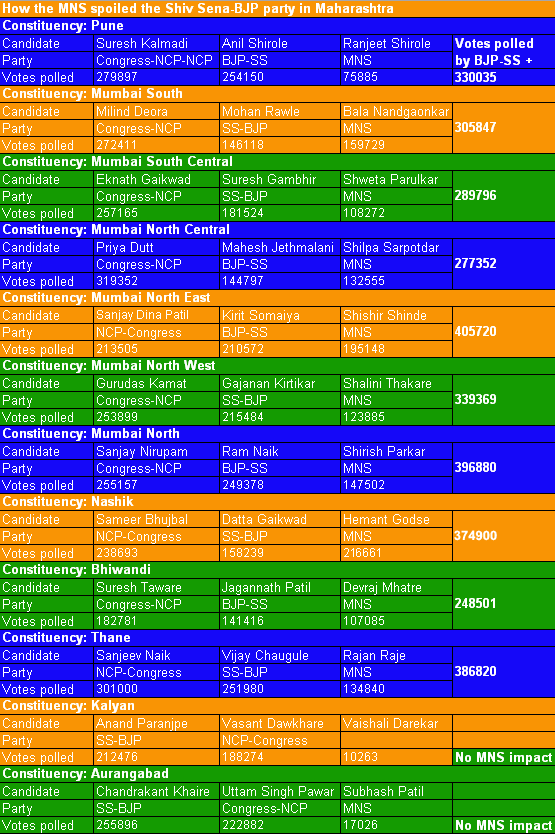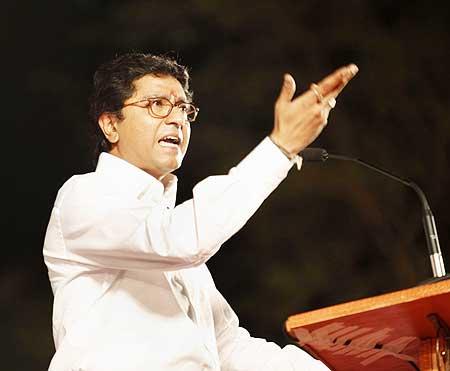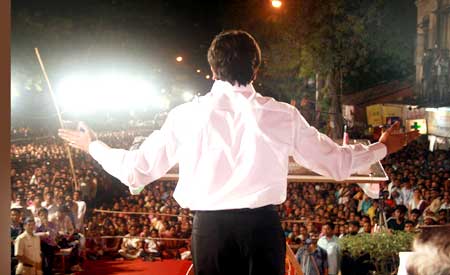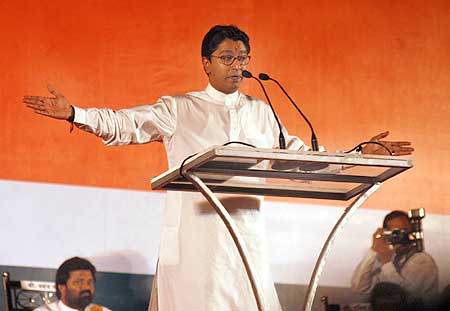
Though no political pundit gave Raj Thackeray and his three-year-old party, the Maharashtra Navnirman Sena, much attention in the state, the MNS has emerged as a force to reckon with. And nobody can vouch for this -- brave media posturing notwithstanding -- better than the Shiv Sena-Bharatiya Janata Party alliance in the state, which lost around 9 seats across Mumbai, Thane and Nashik because of MNS candidates.
If one were to add the votes polled by the Sena-BJP alliance and the MNS in five seats in Mumbai (except Priya Dutt's whose victory in Mumbai North Central with 319,352 votes polled were far higher than the BJP-Sena's Mahesh Jethmalani's 144,797 votes and the MNS's Shilpa Sarpotdar's 132,555 votes added together), Pune, Nashik, Bhiwandi and Thane then their tally far exceeded the tally of the victorious candidates from the Congress-Nationalist Congress Party combine.
There is now a spring in the step of MNS cadres who credit party supremo Raj Thackeray for bagging a four per cent vote share in the state and a whopping 21 per cent vote share in Mumbai.
In fact, with this vote share, the MNS has created a deep wedge in the Shiv Sena's rank and file by successfully emphasising the sons-of-the-soil agenda, which though originally promoted by the Sena in the late 1960s was sidelined after Bal Thackeray anointed his son Uddhav as his political heir in 2006.
With this election verdict Raj Thackeray has proved his uncle and cousin made a tactical mistake. Forlorn, the Sena needs to find quick answers for its debacle, after the party's mainstay, Marathi voters, felt alienated by the party and hopped on the MNS bandwagon in droves. In one Shiv Sena stronghold in the Mumbai South constituency, its four-time sitting MP Mohan Rawale got just five votes.

Maharashtra Home Minister and NCP leader Jayant Patil's 'tea diplomacy' at Raj Thackeray's home and Raj's praise for the BJP's Narendra Modi and Nitin Gadkari also set tongues wagging.
Sharad Pawar's NCP appears to be on a downswing in Maharashtra -- it won nine Lok Sabha seats in 2009 against the 10 it won in 2004 -- and the party is desperately looking for partners even as the Congress plays the wait-and-watch game before it likely snaps ties with its junior ally.
Raj is not willing to show his hand as yet. With nine of his handpicked candidates -- some of them absolute novices in politics -- scoring more than 100,000 votes in their constituencies he knows he can be a kingmaker in Maharashtra after the aseembly election.
MNS officials are already talking of contesting no less than 150 seats during the assembly poll. Their confidence stems from the segmental voting pattern data, which shows that the MNS has a good chance of winning at least 47 assembly segments if it swings a per cent or two of Marathi votes in its favour.
However, Raj's painstaking Lok Sabha election campaign, which he led singularly, will need to be bolstered by a lot of hard work in the assembly poll. For one, the MNS has tested only urban voters with its sons-of-the-soil agenda. Critics of the party think the MNS is an urban phenomenon where Raj can milk his jobs-for-Marathi-manoos (people) agenda because of a large number of migrants and local unemployment in Mumbai, Thane and Nashik.

Also, in his bid to create an image akin to his uncle, Raj has ruled his party with an iron fist and not encouraged a second-rung leadership, critics observe. This may seriously hamper his chances to spread his wings in rural Maharashtra, they believe.
Interestingly, his cousin Uddhav Thackeray, the Shiv Sena's executive president, has extensively toured the rural heartland in the last five years. This helped the Shiv Sena win 12 Lok Sabha seats in 2004 and 11 seats in 2009, despite the setbacks in its traditional bastion, Mumbai.
In election speech after election speech during the Lok Sabha poll campaign, Raj played the development card. The rhetoric against north Indians was toned down; Maharashtrian icons Jyotiba Phule, B R Ambedkar and his grandfather Prabhodhankar Thackeray were often invoked to showcase his progressive credentials.

His party's Lok Sabha vote share will no doubt confuse Shiv Sainiks about who the real champion of the Marathi manoos is.
It is in this context that faint voices of a split in the Shiv Sena before the assembly election are becoming stronger. Though the Shiv Sena's daily newspaper Sammna spews venom against Raj Thackeray for splitting Marathi votes it is a sign that the party is on the defensive.
"If Raj successfully plots a coup against the Shiv Sena in the assembly election then Balasaheb Thackeray will be a broken man. He will realise his mistake of appointing Uddhav at the helm of the party when Raj should have been the deserving choice. But then, three years after the split, the two cousins have bad-mouthed each other so much that nobody sees the possibility of a rapprochement," a Sena insider says, requesting that he not be identified for this report.
There is also a lot of pressure on Uddhav and Raj Thackeray to re-unite for the benefit of the Marathi manoos.
"That would seem improbable now as the election verdict shows who the Marathi manoos considers their saviour," says an MNS functionary. "We are sure we will be able to attract more Marathi voters in the assembly election."
Such confidence is missing in the Shiv Sena camp even as it asks the Marathi manoos to explain why they voted in favour of the MNS, thereby halving the Shiv Sena's strength. The party's supporters would be happy if Uddhav Thackeray and the coterie surrounding him come up with an answer after introspection.